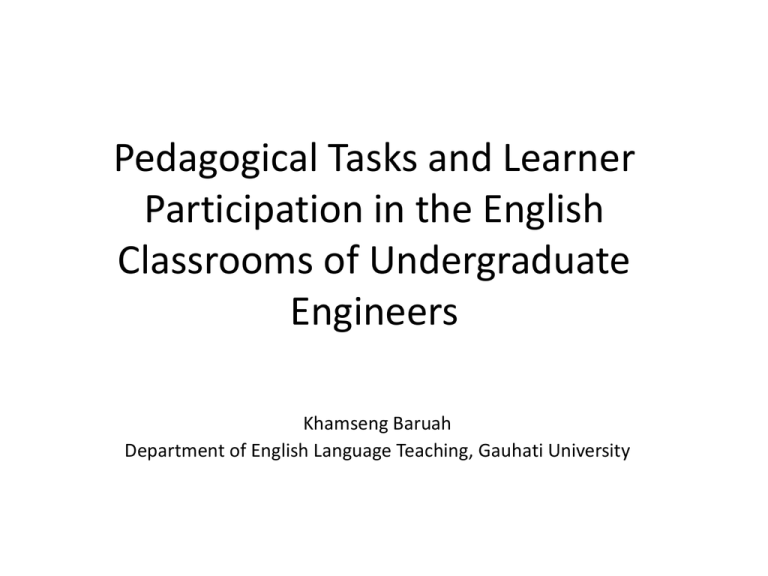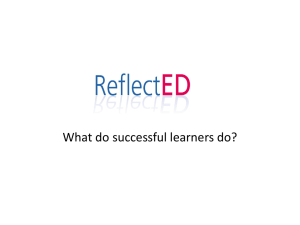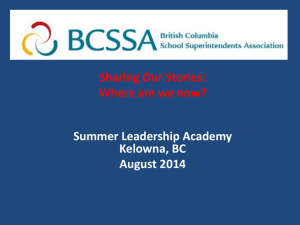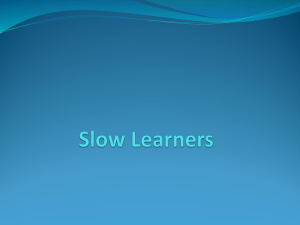Pedagogical Tasks and Learner participation in the
advertisement

Pedagogical Tasks and Learner Participation in the English Classrooms of Undergraduate Engineers Khamseng Baruah Department of English Language Teaching, Gauhati University Background • Engineering has become one of the most preferred career choices • In the last 10 years as many as 8 new colleges have been established • However, the concept of ESP is at a very nascent stage • Syllabuses, barring a few, are largely literature based • In some colleges administrators have felt the need to include additional courses on language proficiency • Learners are largely unaware of their needs • A general negative attitude towards English exists In the classroom… • The communication situation in a language classroom mainly revolves around two sets of participants: the teacher and the learners. • The teacher intends to transmit a message, a pedagogic one, to the learners and expects a response from the learners. • The teacher may use some pedagogical tasks to effectively convey the teaching point to the learners • Learning takes place only when learners actively participate in the teaching-learning process • Though the learning that takes place may not be immediately observable, the amount of interaction that takes place between the teacher and the learners can indicate the effectiveness of a particular activity The challenges in an English classroom of undergraduate engineers The learners: • May not consider it to be as important as other core subjects • May not be interested in doing the task • May not find the task relevant for them • May find it difficult to accept the methodology as they are used to a different method of teaching The study aims to investigate: • whether a clear explanation of the purpose of an activity encourages active learner participation • what kind of reaction can be observed in the class when the learners do not understand the teaching point • does a failure to correctly understand the purpose of a teaching point by the learners affect their motivation in the English class • • • • • • • • • • • • Classroom observation 1 Target group: AEI, 4th semester Number of students: 60 Teaching point: Group Discussion Objective: to make them aware of group discussion to enable them to participate in group discussions Divides the class into 2 groups: Fruits and Colours Further divides the 2 groups into smaller groups of 6 or 7 students All the groups in fruits will take part in a GD All the groups in colours will become observers Gives the topic to groups in Fruits Asks them to think about it for 5 minutes individually Gives a checklist to the groups in colours Asks them to go through it One group from Fruits participates in the GD and the other group from Colours observes them Observations • They do not participate in the GD very seriously • The observers too do not really observe • Some comments from the students: We need to learn ABOUT GD, we don’t need to take part in a GD. We are being observed by our friends, that’s silly. We should be doing serious work, we are being made to discuss issues which are not academic. Classroom Observation 2 • • • • • • • • • Target group: ETE , 4th semester Number of students: 64 Teaching point: Group Discussion Objectives: to make them aware of group discussion to enable them to participate in group discussions Teacher announces the topic Tells them to work in pairs and brainstorm on GD Announces the objectives Asks them to brainstorm on some personality traits that are looked for in a participant through a group discussion Asks them about the importance of GD in their curriculum. She asks them when they need it. Observations • More learners participate • They are clear about the objective of the activity, so they do it more seriously Conclusions • Encouraging learners to participate in an activity needs a lot of effort • Explaining the objectives of an activity may promote learner participation • Learners may turn hostile and may not cooperate when they do not understand the relevance of an activity • Over a period of time learners do get used to a particular method of teaching, but it may be helpful to explicitly explain the objectives of an activity








